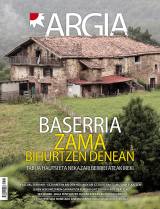If you were an immigrant ...
On July 31, The Newspaper of Catalonia: “A 30-year-old Senegalese has died in a fight. Three individuals have attacked in the middle street in the middle of the day of light. Since the victim had a history of drug trafficking, it may be the reason for the aggression.”
In the news, the journalist reports in her first paragraph that the aggressors have “Spanish nationality”, according to Interior. In such cases, it would be useful to know why the victim has given more importance to the origin of the victim and to reflect on its effect.
1 August. La Vanguardia: “One of the aggressors of the murder of Salou has been arrested.” Third paragraph: “The victim had been living in Salou for ten years, frequenting locals around the well-known Carles Büigas Avenue, where a quiet and educated person has been described. However, according to other sources, it was a trapezoid of drugs”.
Now, imagine that the protagonist of this news, the victim, is the woman. It's clear that the treatment is inadequate, right? As for the Machistan murders, the tendencies constantly criticized by feminists are repeated: Instead of saying “they have killed him”, saying “he has died”, giving weight to the opinions of the neighbours (front) (“he was an honest/normal/quiet person”), blaming the victim (in this case with emphasis on drug trafficking), or defining the news as “done”.
In this case, despite the fact that both the black victim and the aggressors are white, it is not mentioned at all that this could be a crime of racial hatred.
Three days earlier, on July 28, we published an article in Pikara by feminist sociology professor Rosa Cobo. In Sanfermin, a number of men dress with machistan slogans or are adorned, wrote: “The response of the Public Prosecutor’s Office of Navarra is not understood [not to see an offence]. If the users of sheets and t-shirts were other historically oppressed groups, Jews, blacks or immigrants, I would like to know what the answer would be.”
Laws against violence against women have been developed both in the Spanish State and in many autonomous communities. The feminist movement in Euskal Herria has been able to make sexual violence visible on public holidays and to develop numerous protocols and campaigns against it. Racist and LGTBphobic aggressions remain hidden
Many times I hear this statement from the feminists: “If there were 60 racist or homophobic killings every year, society and institutions would not accept it.” This logic is a great ignorance. Do you not know that immigration legislation and xenophobic policies have caused many more people to die on the European coasts? Do you really believe that racist and LGTB hate crimes are further criminalised and condemned in both Spain and France?
In the last decade, dozens of deontological codes have been published to improve information on male violence. Laws against violence against women have been developed both in the Spanish State and in many autonomous communities. The feminist movement in Euskal Herria has been able to make sexual violence visible on public holidays and to develop numerous protocols and campaigns against it. Racist and LGTBphobic aggressions remain hidden. During the Sanfermines there was a homophobic attack (probably many more) and it was only published by LGTB magazine Shanghai.
Moreover, the arguments “if they were immigrants”, “if they were homosexual”, are androcentric. The intersectional view is necessary so that the feminist discourse is not ethnocentric and heterosexist when it comes to denouncing and denouncing sexist aggressions and Machistan violence.
Using this kind of odious comparisons to strengthen feminist discourse is really clumsy and painful. A feminist discourse that is not anti-racist is really clumsy and painful.
Bidali zure iritzi artikuluak iritzia@argia.eus helbide elektronikora
ARGIAk ez du zertan bat etorri artikuluen edukiarekin. Idatzien gehienezko luzera 4.500 karakterekoa da (espazioak barne). Idazkera aldetik gutxieneko zuzentasun bat beharrezkoa da: batetik, ARGIAk ezin du hartu zuzenketa sakona egiteko lanik; bestetik, egitekotan edukia nahi gabe aldatzeko arriskua dago. ARGIAk azaleko zuzenketak edo moldaketak egingo dizkie artikuluei, behar izanez gero.
On November 25, International Day against Male Violence, the Steilas Feminist Union Feminist Secretariat has published a poster: Our body is a battlefield, and all the schools in Hego Euskal Herria have received it. We wish to denounce the violence suffered by women and children... [+]
We live in a context in which anti-feminist and racist hate speech at the global level is on the rise. Far-right narratives are inserted throughout the world by
social networks and political agendas. Racism and anti-feminism have become two great discursive axes that adapt to... [+]
Many times, after looking at the brumas from my house, it has occurred to me not to catch umbrellas, even though I know I will just soak up. Why will it be? Maybe you don't want to catch the umbrella? Maybe in the hope that I don't get wet? Nevertheless, the conclusion has always... [+]
I remember when I was 16 years old, the Ertzaintza first identified me in a concentration in favor of the Basque Country before the Bergara courts. We believed that in Euskal Herria it was legitimate to cry for the Euskaldunization of the courts, but then there would also be a... [+]
The disaster caused by the cold drop in Valencia has left us dramatic images, both because of the immediate consequences it has had, and because the future awaiting us has brought us forward: that this type of extreme climate phenomena will be increasingly numerous and serious... [+]
The update of the Navarra Energy Plan goes unnoticed. The Government of Navarre made this public and, at the end of the period for the submission of claims, no government official has explained to us what their proposals are to the citizens.
The reading of the documentation... [+]
Since the disappearance of the Soviet Union, rusophobia has been growing. The concept of security of the UN Security Council of 2002 is very clear and indicates that the security and stability of the planet must depend on the states that do not intend to challenge the United... [+]
Andoni Urrestarazu Landazabal was born in the village of Araia on 16 July 1902 and died in Vitoria on 21 November 1993. It is now 31 years old and I think it is time to recognize his name and be, because the legacy he left is not well known. Umandi used the name of a mountain in... [+]
Autobiography writing is, they say, the most effective tool for personal development, the most liberating. Pulling things away from the past and remembering them, it seems that it helps unleash the knots of the present. Yes, it helps to understand the present and to draw a... [+]
I have done a review from the announcement of the pandemic to the tragedy in Valencia and have concluded that the disastrous institutional management that lies and forupe as firewalls is constant of the ruling class.
We do not have a valid substitute ruler as long as this... [+]
November 19 is World Bathing Day. Even today, in the twenty-first century, many workers here in the Basque Country do not have the right to use the toilet in their working days. Many transport workers are an example of this.
Toilets are the key to public health and play a... [+]
“You learn walking and singing.” This has been one of the subjects this week in the groups of C2. It wasn't about learning to sing or walking, it was about using the future correctly. The activity has given me what to think and I've wondered how we learn to teach. I've heard... [+]
We know that artificial intelligence is representing many fields in human beings: comfort, speed, efficiency ... We've been led to believe that human endeavor is an obstacle to the speed needs of this capitalist world. The aggressions to reduce our chances of doing, doing and... [+]
In recent weeks it has not been possible for those of us who work in architecture that the climate phenomenon of Valencia has not been translated into our work discourse. Because we need to think about and design the path of water in decks, sewers, plazas and building parks. We... [+]
Self-esteem sometimes seems intimate. But if self-esteem is about the image that you have of yourself, about the value that you give yourself, you'll also have to see the decisions that you can make. What value does someone who can't decide have? So we start to look at our mother... [+]














